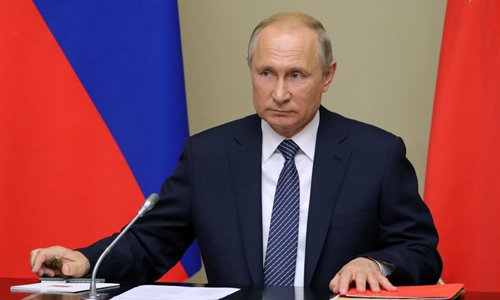HOME >> WORLD
Russia to complete gas pipeline despite America’s sanctions: Kremlin
Source:AFP Published: 2019/12/18 22:23:42

Russian President Vladimir Putin chairs a Security Council meeting outside Moscow, Russia, on Aug. 5, 2019. (Sputnik/Handout via Xinhua)
Russia expects to complete construction of the major Nord Stream 2 pipeline under the Baltic Sea despite approval by the US Senate of sanctions against companies working on the project, the Kremlin said on Wednesday.
The pipeline between Russia and Germany, a key part of Moscow's export strategy for state energy giant Gazprom, aims to deliver Russian gas to Europe via the Baltic.
"We expect that this project will be completed," Kremlin spokesman Dmitry Peskov told reporters, slamming the sanctions as a "flagrant violation of international law."
"Moscow does not like such actions, and neither do the European capitals. Berlin does not like this and neither does Paris," he said, suggesting that sanctions would only lead to higher gas prices for European consumers.
The sanctions, which were inserted into Washington's huge annual defense spending bill, easily passed both the US Senate and House of Representatives.
The bill now goes to US President Donald Trump, who is widely expected to sign the legislation.
US lawmakers have warned the Nord Stream 2 pipeline would bring Russia billions of dollars and vastly increase President Vladimir Putin's influence in Europe at a time of heightened tensions between Moscow and the West.
The 9.5 billion euro ($10.6 billion) pipeline will run under the Baltic Sea and is set to double shipments of Russian natural gas to Germany.
The European Union and Germany have strongly warned the US not to impose sanctions, saying that European energy policy should be decided in Europe.
One major contractor that could be hit by the sanctions is Swiss-based pipeline laying company Allseas, which has been hired by Gazprom to build the offshore section.
Russia had hoped to launch the pipeline in late 2019 but the completion has been delayed by difficulties in obtaining permits from Denmark. Russian officials have said they expect the pipeline to become operational in 2020.
Posted in: EUROPE,WORLD FOCUS